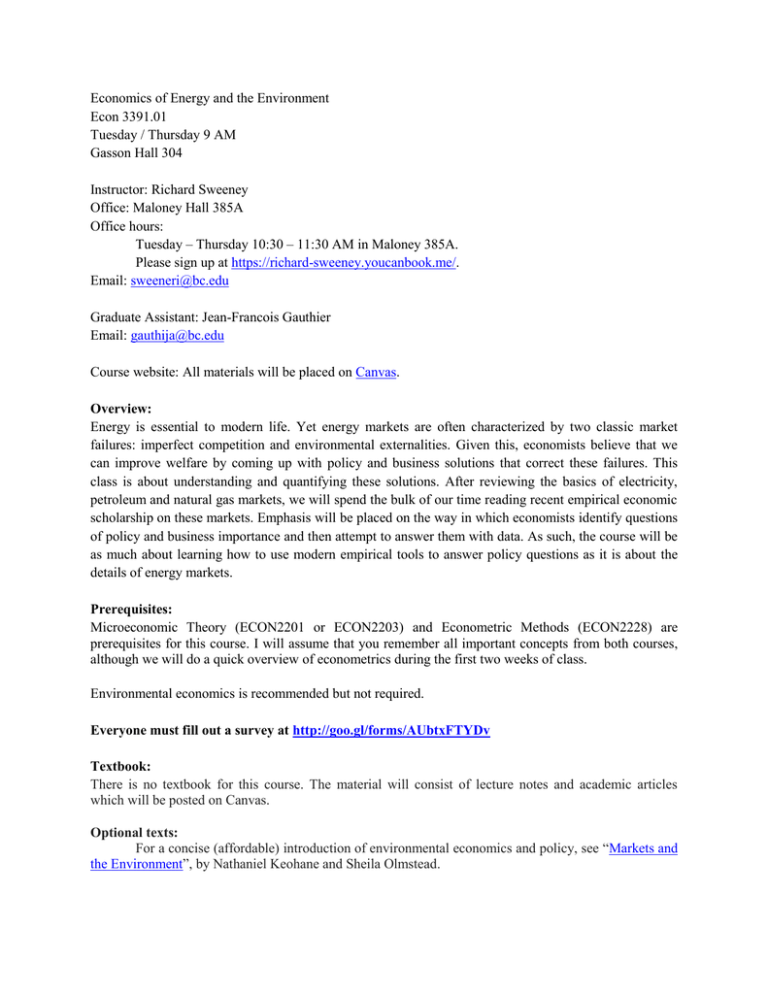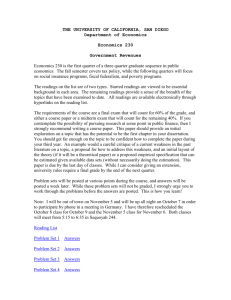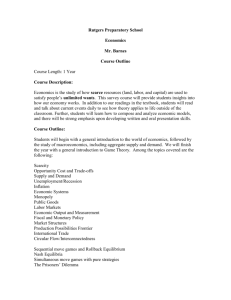Economics of Energy and the Environment Econ 3391.01 Gasson Hall 304
advertisement

Economics of Energy and the Environment Econ 3391.01 Tuesday / Thursday 9 AM Gasson Hall 304 Instructor: Richard Sweeney Office: Maloney Hall 385A Office hours: Tuesday – Thursday 10:30 – 11:30 AM in Maloney 385A. Please sign up at https://richard-sweeney.youcanbook.me/. Email: sweeneri@bc.edu Graduate Assistant: Jean-Francois Gauthier Email: gauthija@bc.edu Course website: All materials will be placed on Canvas. Overview: Energy is essential to modern life. Yet energy markets are often characterized by two classic market failures: imperfect competition and environmental externalities. Given this, economists believe that we can improve welfare by coming up with policy and business solutions that correct these failures. This class is about understanding and quantifying these solutions. After reviewing the basics of electricity, petroleum and natural gas markets, we will spend the bulk of our time reading recent empirical economic scholarship on these markets. Emphasis will be placed on the way in which economists identify questions of policy and business importance and then attempt to answer them with data. As such, the course will be as much about learning how to use modern empirical tools to answer policy questions as it is about the details of energy markets. Prerequisites: Microeconomic Theory (ECON2201 or ECON2203) and Econometric Methods (ECON2228) are prerequisites for this course. I will assume that you remember all important concepts from both courses, although we will do a quick overview of econometrics during the first two weeks of class. Environmental economics is recommended but not required. Everyone must fill out a survey at http://goo.gl/forms/AUbtxFTYDv Textbook: There is no textbook for this course. The material will consist of lecture notes and academic articles which will be posted on Canvas. Optional texts: For a concise (affordable) introduction of environmental economics and policy, see “Markets and the Environment”, by Nathaniel Keohane and Sheila Olmstead. For a more formal treatment of environmental economics, checkout (less math) “The Economics of the Environment”, by Peter Berck and Gloria Helfand, or (more math) “Environmental Economics,” by Charles Kolstad. For a fantastic (affordable) introduction to the econometric methods we will use in this class, I highly recommend “Mastering 'Metrics: The Path from Cause to Effect,” by Joshua D. Angrist and JörnSteffen Pischke. All of the empirical tools used are also covered in “Introductory Econometrics: A Modern Approach,” by Jeffrey Wooldridge. Readings: There will be one or two required readings for each class (tentative list below). It is essential that you complete these readings before class in order to contribute to and benefit from the discussion. To facilitate this, students are required to submit answers to one or two short questions about the readings the night before each class. Failure to submit answers by midnight will reduce your participation grade. Questions will be listed on Canvas along with the posted reading for each class. On some days, the readings will be divided up amongst the class. Please make sure you read each Canvas assignment carefully to avoid extra work. Important policies Attendance policy: Attendance is mandatory. 3 absences will be allowed (for any reason). Beyond that, additional absences will reduce your participation grade. If you do not think you will be able to attend lecture, do not take this course. Seating policy: To facilitate attendance taking and classroom discussion, students will be required to sit in the same seats every class. Seats will be set on the third class (January 26). Laptop policy: Unless presenting, the use of laptops will not be allowed in class. If you need to use a laptop for medical reasons, please come speak to me after class. Academic integrity: Students are advised to carefully review and abide by the university’s policies on academic integrity. Any instances of cheating or plagiarism will be reported to the Dean’s office without exception. Lecture slides: will be posted on the course website prior to each class. I strongly suggest you print them out and take notes on them during class. Grading Problem sets – 20 percent There will be 4 problem sets. All problem sets must be submitted through Canvas before class on the due date. Solutions will be posted at the start of class, and, as a result, late problem sets will not be accepted. You are allowed to work in groups, but each person must hand in their own problem set. The problems sets will involve using Stata. Students must submit their (own) Stata code as well as a separate document writing up their answers to the problems. Paper presentation – 10 percent Each student will lead the class in discussion of one empirical energy paper. These dates are marked with an * in the reading list below. Working in pairs of two, students must prepare slides and plan to talk for 15-20 minutes. Discussion posts – 5 percent This class is about using economics to understand real world energy and environmental problems. As part of this, students will be encouraged to read relevant news articles and blog about issues they find interesting. In two short discussion entries on Canvas, each student will link to an article from one of these sources, provide a brief summary, and list at least one research question that emerged. Entries should be posted to the Discussions section of Canvas so that other students can join in the (constructive) conversation. Although this should be seen as an ongoing assignment, I have posted two due dates by which you should plan to have your first and second entries in. They are frontloaded because the hope is that one of your blog entries may turn into a paper topic. Participation – 15 percent Students are expected to be engaged in class. If I feel that this is not happening I will resort to cold calling and quizzes gauge preparedness. Final paper – 50 percent Working in groups of two or three, students must write a research paper on an energy or environmental issue of their choosing. This will be discussed in detail in class, but please note the paper related dates below. Schedule & Reading List^ Econ 3391.01, Spring 2016 Class Date 1 1/19 2 1/21 3 1/26 4 1/28 5 2/2 6 2/4 7 2/9 8 2/11 9 2/16 10 2/18 11 2/23 12 2/25 13 3/1 14 3/3 3/8 3/10 15 3/15 16 3/17 17 3/22 3/24 18 3/29 19 3/31 20 4/5 21 4/7 22 4/12 23 4/14 24 4/19 25 4/21 26 4/26 27 4/28 28 5/3 29 5/5 5/8 Assignments PS1 due Blog 1 due PS2 due Paper group due Blog 2 due Paper topic due PS3 due PS4 due Module Intro Methods I Methods II How to read a paper Intro to electricity markets Electricity demand Deregulation Taxing Carbon Energy efficiency overview Appliances Buildings Weatherization wars Behavioral econ & EE Renewables - Wind No class No class Renewables - Solar Oil/ transportation intro Keystone & Oil Export ban No class Gasoline demand elasticity Gasoline competition Behavioral econ & cars Electric vehicles Intro to natural gas markets Regulating natural gas Fracking overview Fracking costs Fracking costs II Student presentations Student presentations Student presentations Required Readings CEA 2015 - Chapter 6 Greenstone & Gayer 2009 NJS 1999 Borenstein 2002; B&B 2015 Allcott (2011); Rapson & Jessoe * Wolfram & Davis ; Cicala RFF; Meng; Cullen & Mansur Allcott & Greenstone * Coolers; Labels; Water Heaters Levinsohn NYTimes; GFW * Allcott Opower Borenstein 2012; AGS 2015 vBGS; Gillingham & Bollinger Knittel (2012) * CRS 2014; Borenstein & Kellogg * HKS; Davis & Killian; LLM * Hastings 2004; 2008; 2009 * Allcott & Wozny; BKZ Mansur et al Joskow Davis & Muehlegger TBD Timmins TBD Paper due * Indicates student paper presentation days ^ Reading list tentative and subject to change. Check Canvas each class for required readings!



